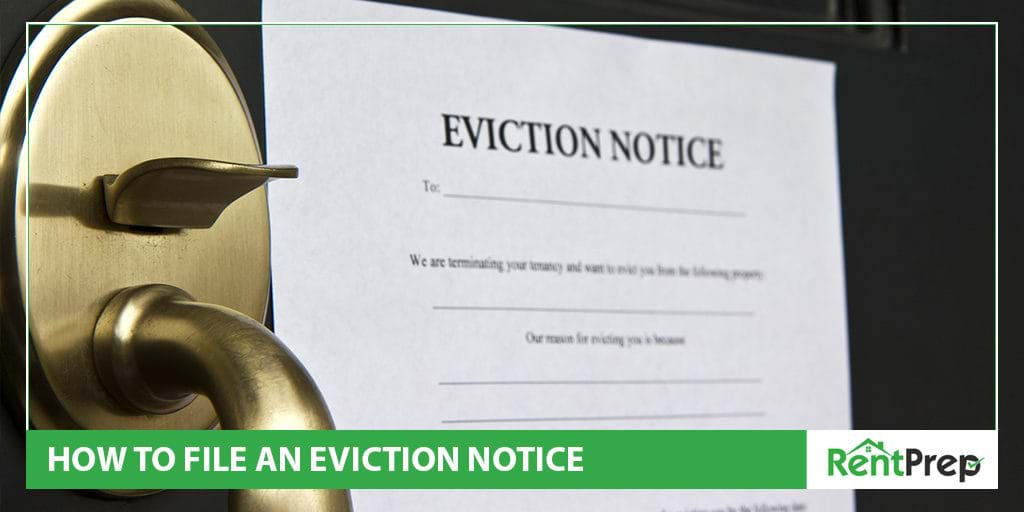
Whether it’s your first year as a landlord or you’re a seasoned professional, evictions are sometimes unavoidable. You can try to prevent them by completing a tenant screening before potential renters move in, but this might not always work.
You can have the best tenants in the world, but they may experience hardship and not be able to pay rent. If push comes to shove and you’re lead to evict them, it can be a complicated process.
Eviction may seem like a dramatic thing to do, but it’s part of being a landlord. It should be communicated very clearly when they sign a lease how much rent is and when it’s due.
When you’re evicting somebody, usually they understand and go politely. Since this isn’t always the case and some tenants make the eviction process a bit more complicated, we wanted to share with you a step-by-step guide of how to file an eviction notice to make your job a bit easier.
Table Of Contents For Filing An Eviction Notice
- How To Prepare For An Eviction?
- Reasons For Evicting A Tenant
- Meet With Your Tenants
- Giving An Eviction Notice
- Filing An Eviction With A Court
- Go To A Court Hearing
- Evicting The Tenant After You Win The Case
- Getting Paid
How To Prepare For An Eviction?
First off, there are some things you need to know in order to properly prepare for an eviction. Below you’ll find everything you need to know to make sure you’re properly following the laws and how to be reasonable with tenants.
Being Aware Of Eviction Laws

It’s important to know that eviction laws vary quite a bit from one state to another. It can save you a lot of hassle if you make sure you’re well-versed about these laws and keep them in mind when you’re writing up a lease agreement.
This ensures that the document has authority and that the tenant is very clear about the process of eviction if it comes to that. Oftentimes landlords will have a lease agreement written by a lawyer that knows the eviction laws for whichever states you have a property in.
If you’re in a situation where you’re lease agreement has already been written and you need to evict someone, spend a few hours researching the state law to make sure you’ll be able to win an eviction case if it ends up in court.
Know Your Stuff
There is something called the “Uniform Residential Landlord and Tenant Act” or URLTA for short. This gives a much more detailed look into the legal side of all things eviction. There are 21 states at the time of writing this that use the URLTA method when they’ve created their state-specified landlord and tenant laws. Be sure to check if your state is one of them!
Don’t DIY It
It’s crucial to know that “self-help” evictions are not legal in the United States. It doesn’t matter how bad the tenant is, you can’t take matters into your own hands legally. We wanted to include a few actions that are illegal for you to do without a court order; let’s take a look:
- You may not take any of the tenant’s belongings off the property.
- You can’t physically remove the tenant yourself.
- It is not legal to change the locks or purposefully lock the tenant out of the residence.
- As a landlord, you can’t shut off essential utilities such as water or electric.
- In no way can you harass them.
During the eviction process, you want to stay on good terms with the court, which is why you should avoid doing any of the actions above, at all cost. Just like how the judge will be looking into the tenant, they will also be looking into you.
Being Friends With Tenants
It’s completely normal for tenants and landlords to form a friendly relationship. Many landlords will spend time with their tenants and form friendships. This can make things complicated if eviction comes into play.
Evicting a tenant you’re friends with can ruin the relationship. While it’s completely normal and encouraged to be friendly with your tenants, it’s discouraged to become friends with them for this very reason. Not only will you lose a friend and a tenant, but the eviction process will also become much more stressful.
Reasons For Evicting A Tenant
A messy mistake that can be made by a landlord is evicting a tenant that hasn’t done anything worthy of an eviction. The whole process can be long and complicated for you as a landlord, which is why it’s crucial to make sure you have a valid reason for evicting a tenant. Here are some of the more common reasons why you may evict someone:
- If the tenant fails to pay rent (once or several times)
- If they violate the lease agreement in any way
- You can evict someone if they cause a lot of damage to the property
- If there are noise, heath, or occupancy rules in place and they are broken
- If they are causing any safety or health issues for themselves and/or other tenants
When you have a tenant that has done something that results in an eviction, always make sure you give them proper notice as well. The notice varies from state to state and might be situational. Some states require a 24-hour notice, while others require at least seven days.
Document anything that can be considered proof against your tenant. Remember that the court system believes that people are innocent until they are proven guilty, so be sure you can prove just that.
Meet With Your Tenants

Sometimes there are situations where eviction isn’t your best choice. This can be because the laws of your state aren’t on your side or you just don’t have the time to create an entire eviction case. If you find yourself in this situation, try meeting up and talking with your tenants.
When you do this, make sure it’s in a public place like a coffee shop. This can be important for safety purposes and usually prevents the tenant from lashing out like they would in private. Talk as adults about the situation at hand and try to reason with them.
It’s important to come across as understanding while still being stern. Usually, this helps the tenant understand things from your point of view and often leads to them leaving your property without any further issues.
Your Tone Makes A Difference
It may be helpful to have a prepared speech when meeting with a tenant. This can help you keep your thoughts straight and ensures that you’re able to cover the topics and concerns that are creating an issue. Say something like the following:
“I totally understand and sympathize that you’ve run into troubles when it comes to paying rent. I feel for you and have been there myself. I’m in a tough spot here since as a landlord; I need to make sure my tenants can pay rent. If for whatever reason you aren’t able to do so, you’ll have to leave. I want you to know that I respect you, which is why I want to give you the opportunity to pay rent now or leave on your own. If not, I’ll have to file an eviction lawsuit and that can be quite the process for both of us.”
Obviously, you can change that to fit the specific situation you may find yourself in. Let them know that going through an eviction lawsuit will damage their credit score for up to seven years. Their chances of being able to rent future properties, get loans, or get approved for buying a home will be negatively affected for a very long time after the eviction.
You may also want to let them know that when a landlord wins an eviction case, the tenant will be sued for any rent that is owed. When this happens and if the tenant doesn’t have the money, their employer will get involved and said tenant’s wages will be garnished.
Tell them you don’t want them to go through any of that extra stress, especially when it will end up costing them more and possibly ruin their financial future. Ask them how they’d like to move forward. Give them the option to pay you now (or by a specific date) or serve them an eviction notice.
Giving An Eviction Notice
Sometimes no matter how stern and understanding you are you’ll have uncooperative tenants. If you’ve given them options and they’ve chosen not to play by the rules, you have the right to evict your tenant. If it has come to this, it’s absolutely crucial to make sure you’re following the legal procedures correctly.
You’ll want to make sure you give them a proper notice of eviction, which as you read earlier, can vary from state to state. A notice of eviction is oftentimes just a simple document or form that gives the tenant an ultimatum and tells them when they’re being evicted, what they can do to avoid it, and why they’re being evicted.
Below you’ll find a handful of helpful tips when it comes to writing and serving an eviction notice.
- Make sure that the eviction notice includes a deadline date for the tenant to pay rent or be moved out by.
- The eviction notice has to show the full amount that the tenant owes you including all fees and past rent due.
- As a landlord, you are required to post this eviction notice within a certain number of days before you can actually file eviction paperwork with the court.
- You can post the eviction notice by taping it to their front door or mailing it via the United States Postal Service.
- If you don’t know how to write an eviction notice, you can use a state-specific eviction form template that can be found online.
After you’ve done these things, the ball is now in the tenant’s court so to speak. They are aware that you’ve done your research and that you know the laws that correlate with the situation at hand.
Usually, the eviction notice is enough for them to realize the gravity of the situation and move out. If that isn’t the case, then after a certain amount of time, usually seven days, it is time to file an eviction with the court.
Filing An Eviction With A Court
So, if you’ve come to the unfortunate situation where you need to file an eviction with the court, it’s time to head to your local courthouse. During this time it can be overwhelming to think about all of the time, money, and patience that this costing (and is going to cost) you.
Once you arrive at the local courthouse, the clerk will schedule your hearing and they will notify the tenant; you won’t have to. One thing you will have to do is show that you’ve given a proper eviction notice, along with an appropriate amount of time for them to move out.
Go To A Court Hearing
When it’s time for you to attend the court hearing, you’ll have to bring a lot of documents with you. This is why it’s important to know how to prepare for the court hearing and what documentation you may need. Below you’ll find all of the required documents, but you may need more for your given situation.
- A lease agreement
- Any bounced checks from the tenant
- Proof of any records of payment
- For other eviction cases, any photographs or other evidence to prove your case
- All communication record between you and the tenant
- A printed copy of the written notice you gave the tenant
- Proof of the date you gave the notice (this can be done by providing a receipt from the post office)
Since you have to bring all of the documents above, the tenant will have a hard time proving to the judge that they paid their rent or that they never got an eviction notice. You will likely have the benefit of the doubt from the court ahead of time, which may help you win the case.
We at RentPrep want you to be as prepared as possible. Do plenty of research before the hearing, get a good night’s rest, and make sure to have all of the documents necessary. Be honest, respectful, and professional while you’re in the courtroom.
Evicting The Tenant After You Win The Case
At this point, you’ve won the court case and now your tenant has a certain amount of time to leave the premises. Sometimes, even at this point, the tenant will not leave on time. If you find yourself in this situation, you’ll need to go to your local sheriff’s department to have them escorted out by police.
Then, unfortunately, it’s your job to take all of their possessions and put them in storage with an inventory of what items have been stored.
Getting Paid
So, what about all that money that tenant owes you? You want to get paid and we want to make sure you get what you’re owed. Below you’ll find a handful of ways you can collect the income that they owe you.
Garnish Their Wages
If during the eviction court hearing the judge decides that the tenant owes you rent or fees, you will get a court order form delivered to you that you would then give to the tenant’s employer. This is incredibly convenient for you and inconvenient for your tenant. You can avoid this process if the tenant decides to settle the amount that they owe.
Since not all tenants are able to settle, you may have to start the process of garnishing their wages. This is also embarrassing for the tenant, but it will force the employer to garnish their wages so you get paid before the tenant does. This may be a little complicated if your tenant works for themselves, is unemployed, or is a freelancer. Make sure you know how the law correlates to those types of tenants as well.
Go To Small Claims Court
Sometimes you’ll have the convenient option of going to small claims court. While going to court may sound inconvenient, oftentimes, you can combine the eviction lawsuit with a small claims lawsuit.
This means that during the eviction hearing, you will also be able to sue the tenant for any back-due rent or money from fees that they owe you. Some local courts may not allow doing both hearings at once; if you find yourself in this situation, you’ll have to file an entirely separate lawsuit to get your money.
Garnish Their Tax Refund
It may seem extreme, but you can garnish your past tenant’s tax refund if they owe you money. The tenant will be notified and likely shocked to find out that their entire refund and more can go to you instead of them.
You have the option of giving them a heads up if you’d like, but by no means is that necessary.
Get A Debt Collector Involved
Lastly, you can get a debt collector involved. A debt collector will report the debt from the tenant to credit bureaus such as Equifax and TransUnion. This can help future landlords know the history of this tenant’s rent payments and can help them avoid getting screwed over as you did.
Final Words
We know that there is a lot of work that goes into being a landlord. It’s like having 20 jobs in one. Unfortunately, sometimes as a landlord, you’ll have the uncomfortable situation of needing to evict somebody.
Hopefully, this guide helps make that process a bit easier for you. Now you know how to file an eviction notice, what documentation you’ll need, and reasons you may or may not be able to legally evict someone.
It’s important to give the tenants proper notice, and it can make a world of difference to sit down with them and have an adult conversation. Remember to sympathize with them if they’re struggling to make rent, but also be stern and let them know that they have one of two options: they can pay rent or leave.
We hope that you’ll never have to need this guide, but we also know that it’s incredibly common for landlords to have to give evictions. Now, you’re a bit more well-versed and have the knowledge you’ll need if you ever find yourself in this situation.

